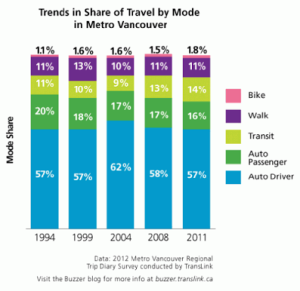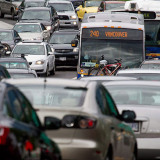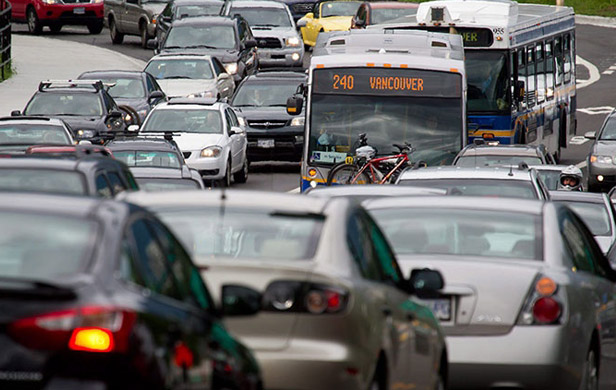The following is a letter to the editor from Malcolm Johnston of Rail for the Valley.
One has to shake one’s head with the ‘Metro Vancouver congestion improvement tax’ referendum, as clearly the Metro mayors haven’t a clue what they are talking about.
The name, Metro Vancouver congestion improvement tax is false advertising, as the only way to reduce road congestion and associated gridlock is by reducing road space for cars and this is not being done.
 Subways don’t reduce congestion and are only built to accommodate high ridership on routes which demand long trains and large stations. Traffic flows along Broadway come nowhere close to justifying a multi-billion dollar subway which, if built, will drag TransLink into a financial morass as it has done in other cities. The ill-planned LRT for Surrey, which is being planned as a poor man’s SkyTrain, will do little in alleviating congestion.
Subways don’t reduce congestion and are only built to accommodate high ridership on routes which demand long trains and large stations. Traffic flows along Broadway come nowhere close to justifying a multi-billion dollar subway which, if built, will drag TransLink into a financial morass as it has done in other cities. The ill-planned LRT for Surrey, which is being planned as a poor man’s SkyTrain, will do little in alleviating congestion.
The one mode with a proven record of alleviating congestion is modern LRT because it uses road space for its route, thus modern LRT reduces road space for cars while at the same time offering a convenient and attractive transit alternative. It’s why LRT is built around the world and SkyTrain is not.
So instead of the oxymoronic, ‘Metro Vancouver congestion tax’, a more accurate name would be; “Let’s do the same thing over again and hope for different results” tax.
Oh, excuse me, that’s the definition for insanity.



Malcolm, as usual, makes a lot of sense. So much so that politicians don’t listen … It demonstrates once more Mair’s Axiom 1 “you make a serious mistake assuming that people in charge know what the hell they’re doing and, 2. You don’t have to be a 10 in politics, you can be a 3 if everyone else is a 2.”
I agree with the authors assertion that the only way to reduce congestion is to reduce space for motor vehicles, but ultimately I infer that he seems to want us too all cut off our collective noses to spite our faces–
Ok, so calling the pst bump a “congestion improvement tax” is kind of silly– but the Province forced this referendum on us and this is the question we have. The real issue is will the money go to something worthwhile? and will be royally screwed without it? and I think the answer to both of those questions is a resounding yes.
We need more and better bus service– if the referendum does not pass we wont get it.
We need to replace the Pattullo bridge- If the referendum does not pass that many more people Will die horribly in head on collisions there. etc. etc.
Also, how is it that according to Mr. Johnston, we should be building conventional LRT instead of skytrain, yet building LRT in Surrey is “a poor man’s SkyTrain, will do little in alleviating congestion” Huh? Is he for LRT or against it? He claims that “modern” LRT is superior alternative to Skytrain on Broadway because it will “use road space for it’s route” so Is Mr. Johnson Proposing that we rip up all the roadway on Broadway and run trains on it exclusively? Personally, I don’t drive a car, and I don’t want too so I think that would be a great idea, but I have a feeling that the muggle community would not really go for it.
Talking about metro Vancouver mode share isn’t all that helpful because more people taking transit in Richmond doesn’t mean that the all of a sudden stop driving to work in Maple ridge. If he wants to make the case that our investments in rapid transit are not working he needs to try a little harder.
I would like to address Justin’s comments.
We probably need some bus improvements, but buses are not the answer, we must address a more basic problem, our transit system is user unfriendly and that is the kiss of death for a transit system.
If you want to provide a lot more transit service, sure invest with buses, but do not expect to reduce congestion as buses are very poor in attracting the motorist from the car. Even BRT or it even more expensive cousin, guided bus have a poor record in alleviating congestion.
The proven method is modern LRT because modern LRT operates on-the pavement, which makes it visible to the transit customer and handy to use, while at the same tame taking a way road space which reduces congestion, while providing an attractive alternative to the car.
The problem with LRT in Surrey is that it is being built as a poor man’s SkyTrain, acting as a feeder to the SkyTrain mini-metro system and not a viable transit alternative. In short, there is no benefit to the motorist to switch to transit because the LRT line is just an appendage of the SkyTrain system, with an awkward transfer.
Ask yourself this question: “As a car driver, why would I use LRT in Surrey?”
http://www.railforthevalley.com/latest-news/zweisystem/the-whalley-king-george-white-rock-light-rail-line-revisited-again/
Rapid Transit does not reduce congestion and it hasn’t. The Canada Line never took the the promised 200,000 car journeys off the road nor has it improved transit in the region as the forced transfer at Bridgeport station has done more to deter ridership than to improve it. One can lose over 70% of potential ridership per transfer.
The one proven tool in the transit planner’s box of tricks, modern LRT is shunned in Vancouver because those who forced the SkyTrain mini-metro on the region knew since 1983, that SkyTrain was inferior to light rail and created the LRT boogeyman myth, so LRT would not be built. For 31 one years the ‘man of straw’ arguments have been repeated so often that they have become truth. Herr Goebbels would be pleased.
Now we must add in the 110,000 U-Passes issued to post secondary students, which has greatly increased ridership pressures on the bus routes leading to universities. The U-Pass, first conceived to put “bums” on empty seats on dedicated transit services south of the boarder, in Vancouver the U-Pass has over crowded already crowded buses, deterring full fare customers which means the most heavily used bus route generates little income and we worry about fare evasion?
What is missing in our transit debates is meaningful public input, but most public input is based on common sense and TransLink, goaded by politicians don’t want common sense, they want expensive rapid transit projects to win elections and if the fools (sorry the electorate), vote to pay for being bamboozled, all the better for us!
What is needed to solve our present debacle is not new taxes, but implementing a sound and an affordable transit plan, based on modern public transit practice. Sadly, TransLink is not up for the job and regional politicians, except for a small handful, do not have the maturity to plan for transit, especially behind closed doors.
A no vote will bring this house of cards down sooner, rather than later.